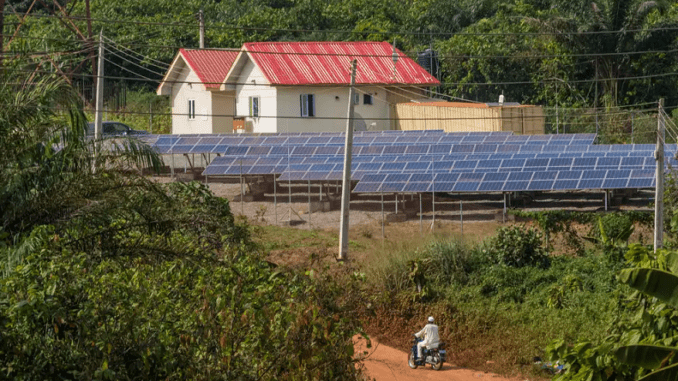
Off-grid solar systems present a valuable alternative for Nigerians affected by frequent blackouts.
Nigeria has the largest population in Africa – 224 million people, placing it sixth in the world, just behind Indonesia and Pakistan, and more than the combined populations of Germany, France and the UK.
Most Nigerians living in cities experience frequent power cuts, while three-quarters of rural Nigerians remain without access to electricity at all.
One solution to this issue is off-grid solar systems such as rooftop panels and rechargeable solar-powered batteries. Chinese firms have been increasingly active in meeting Nigeria’s growing demand for these.
Grid instability
The condition of the national grid has been steadily deteriorating. In 2011, there were 13 complete grid collapses and six partial outages. By 2022, this had risen to 22 collapses and 20 partial outages. In March of that year, the grid collapsed twice within 48 hours, plunging millions into darkness.
Just over 55% of Nigeria’s population had access to electricity in 2020, according to data from the World Bank. That’s far lower than the global proportion of 90%, though higher than the 48% for all of sub-Saharan Africa. The regular grid failures mean generated electricity frequently goes to waste.
The government launched a plan last year to cut the country’s greenhouse gas emissions to net zero by 2060, and ensure all Nigerians are provided with electricity by 2030, in line with UN Sustainable Development Goal 7.
The plan aims to phase out diesel and petrol generators, which are widely used across Nigeria, and expand capacity of both gas-fired and renewable electricity generation. It specifies that renewables will be an important part of “electrification … in sectors such as buildings, industry and transport.”
Renewable energy renews hopes
The Nigerian solar off-grid market has grown at an average annual rate of 22% over the past five years, among the fastest in Africa, notes Nikki Adams, team lead at Prime Renewable Energy Solution, a company based in the capital, Lagos. He says this is partly due to the strong need for alternatives to the faulty power grids, as well as recent government policies favouring solar installations.
In 2021, Nigeria and China signed an agreement to boost renewable electricity in the West African country. The idea was to build and upgrade renewable energy facilities nationwide, and increase electricity supply in rural areas.
As a result of the pact, 200 sets of off-grid photovoltaic (solar) equipment were donated to Nigeria’s rural communities by PowerChina-Kunming Engineering Corporation and Yunnan province’s Department of Commerce. The donation was made under a scheme called “Green Energy Africa, One Belt, One Road Lightening Up of Thousands of Households”.
Meeting demand
It is not only overseas donations that have found a place in Nigeria’s solar-powered system. Chinese firms are providing Nigerians with affordable solar panels, solar street lights, energy-saving bulbs, rechargeable lamps and fans, among other clean-energy products. Solar power is what matters to all Nigerians now, irrespective of their economic status. It is providing alternative power sources to millions of Nigerians, especially in remote areas.
Solar future
Babatunde Fashola, former minister of works, power and housing, is optimistic about solar power development in Nigeria.
“The prospects of clean energy leapfrogging conventional sources are certainly within reach for Nigeria,” Fashola said. He added that this is particularly in light of rising diesel costs, “and partly due to the increased market penetration of renewable energy solutions.”
Chinese companies are likely to continue playing a role. At the 3rd Belt and Road Forum, held in Beijing in October, the Nigeria government received US$4 billion worth of “letters of intent” for investments and new projects in solar, clean energy and smart grid initiatives.

But with grid collapses and blackouts still a common reality, off-grid solar will have to develop quickly in order to provide better and cleaner power connectivity for Nigerians by 2030 – the government’s target year for universal energy access.
*** This is an edited extract from China Dialogue.
Source: China Dialogue, 20 Nov 2023. https://chinadialogue.net/en/energy/nigerians-benefit-from-chinese-solar/